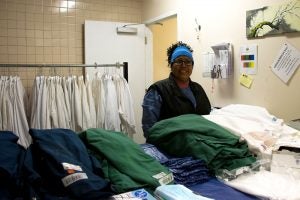It is so easy to get caught up in the competitive side of business. Or maybe that is just me, the marketer, always listening and looking for the things that push my brands ahead of the pack. I had one of those moments when I heard about GreenGate’s participation in the USDA Quality Monitored program. I thought, this is our competitive edge! But in an email, Richard Warsaw, the Food and Safety Manager at GreenGate, reined me in. “I would focus more on building relationships and providing transparency to the supply chain.” That got me to thinking about the rollout of the Food Safety Modernization Act, what that means for growers and producers, and that maybe there is something valuable to be learned here.
Growers and producers in the nation’s salad bowl (Yuma, Arizona, and Salinas, California) know the responsibility on their shoulders with growing leafy greens. With food safety as their top priority, they keep unsafe microorganisms such as E. coli, listeria and salmonella out of our fresh food supply. Organizations such as the Leafy Greens Marketing Agreement were formed to provide guidelines, certification programs, and audits to keep those micro-contaminates at bay. What many people don’t realize is how vigilant everyone in the produce supply chain has to be from growing, water supply, worker hygiene, processing, transporting, and then the final handling of the product. But these regulations are there to keep the growers on track and give them an opportunity to be transparent in their operations.

Here are a few of the governing bodies, regulations, and certifications that you’ll see from the leafy green community.
LGMA –Leafy Greens Marketing Agreement
This organization that has put together a set of science-based food safety practices with oversight from the California Department of Food and Agriculture for leafy green growers and handlers in California. To be a certified member, a company will have routine audits to ensure the greens are safe. Ninety-nine percent of California leafy green growers and processors are members of the LGMA.
AZ LGMA – Arizona Leafy Greens Marketing Agreement
This is similar to the California version. These programs work with the growers and producers to ensure a food safety plan is developed, employees are trained on these best practices, and then reinforced by audits.
FSMA – Food Safety Modernization Act
This is the regulatory side that is now being implemented. Growers that followed the LGMA compliance are already covered under this regulation. It is a similar plan of action, with required training and certifications for produce growers. The food safety plan covers all aspects of the growing process from water, soil amendments, worker hygiene, harvest, and handling of the product.
SQF Level 3 – Safe Quality Food
This is a program that sets a standard of food safety practices and traceability recognized by retail and food-service providers around the world. There are different levels set for the type of food going through SQF certification. The first level starts with the fundamentals of food safety, the next level covers a food safety plan, and level 3 brings in a focus on food quality.
USDA Quality Monitored
This is a voluntary program where the USDA can come in with unannounced audits to a vegetable based food processor. It gives an objective analysis of safety and quality practices to both buyers and the processors they audit.

The regulation that goes into the leafy greens that you eat at home or in restaurants isn’t intended to be a burden to the farmer or a checklist for a processor to complete. This is the produce industry’s opportunity to give everyone a look into the how’s and why’s behind the end product.
What you’ll find is the heart of food safety is embracing accountability with regular audits and unannounced audits (a unique feature of the USDA QMP). Food safety is about transparency in what is happening to your food from the time it is planted to the time it lands on your plate with logs, testing, and traceability. Inviting buyers to see operations first hand builds lasting relationships centered around trust. Food safety isn’t just a bunch of rules, but embracing the attitude of honesty, transparency, and accountability. Richard is on the right track here — we have the opportunity to give consumers reasons to trust us with growing their food. This is what gives us the competitive advantage against the real enemy, microorganisms, and keeps us winning in our fight for safe, quality produce each and every time.
Amber Parrow is the marketing director for Fresh Avenue, a group that represents produce farms and producers with national sales and marketing. You’ll find her with a camera in a romaine field or behind the computer promoting brands that promote quality, safe, and nutritious food.



